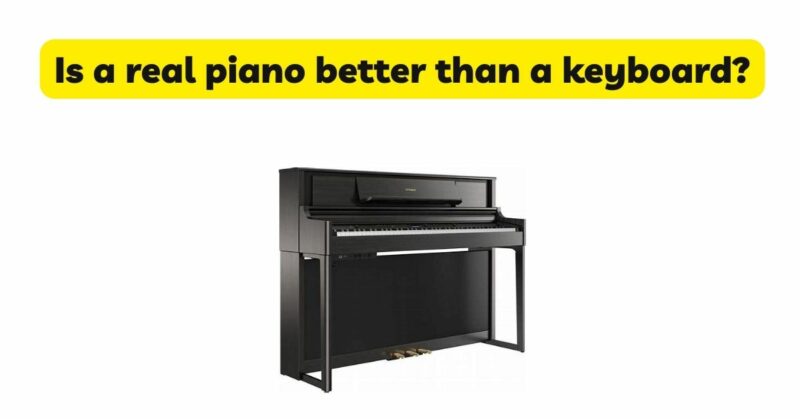The debate surrounding the superiority of a real piano over a keyboard has been ongoing for years, with passionate arguments on both sides. Real pianos are revered for their authenticity, while keyboards offer convenience and versatility. In this article, we will delve into the factors that contribute to the perceived superiority of a real piano and evaluate whether it is truly better than a keyboard. By examining various aspects, we aim to provide readers with a comprehensive understanding of both instruments and help them make an informed decision based on their individual needs, preferences, and circumstances.
- Sound Quality and Authenticity: Real pianos are often hailed for their unparalleled sound quality and authenticity. The acoustic nature of a real piano, with its vibrating strings, wooden soundboard, and resonant body, creates a rich and nuanced sound that many musicians find irreplaceable. The natural harmonics, overtones, and dynamic range of an acoustic piano cannot be precisely replicated by keyboards. However, modern keyboards have made remarkable advancements in sound sampling and digital technology, offering high-quality piano samples that closely mimic the sound of a real piano. While they may not achieve identical authenticity, keyboards have come a long way in bridging the gap and satisfying the needs of many musicians.
- Touch and Feel: The touch and feel of a real piano are often regarded as superior due to the weighted keys and varying touch sensitivity. Acoustic pianos feature a mechanical action that translates the player’s touch into the mechanism of hammers striking the strings. This tactile feedback allows for a nuanced and expressive playing experience. Keyboards, especially those designed to emulate the feel of acoustic pianos, offer weighted or semi-weighted keys with graded hammer action. These technologies provide a realistic touch and can mimic the response of an acoustic piano to a considerable extent. While the touch of a real piano may be preferred by some pianists, others find the touch sensitivity and response of keyboards to be suitable for their musical needs.
- Maintenance and Durability: Real pianos require regular maintenance, including tuning, voicing, and occasional repairs. The strings, hammers, and soundboard are sensitive to changes in temperature and humidity, necessitating ongoing care and attention. Additionally, moving and transporting a real piano can be cumbersome and costly. Keyboards, on the other hand, have minimal maintenance requirements. They do not need tuning and are not as susceptible to environmental factors. Keyboards are also lightweight and portable, making them easier to move and transport. In terms of durability, real pianos, when properly maintained, can last for generations, while keyboards are generally more prone to wear and tear due to their electronic components.
- Portability and Flexibility: Portability and flexibility are areas where keyboards excel. Keyboards are compact, lightweight, and easily transportable, making them suitable for musicians who frequently perform, travel, or have limited living spaces. They can be battery-operated or powered by an electrical outlet, allowing for versatility in various settings. Real pianos, on the other hand, are large, heavy instruments that require a dedicated space. Moving and transporting a real piano can be a logistical challenge and may require professional assistance. However, it is important to note that there are portable digital pianos available that offer a balance between portability and the authentic piano experience.
- Versatility and Additional Features: Keyboards offer a range of additional features and functionalities that can enhance a musician’s creativity and versatility. Many keyboards come with various instrument voices, rhythms, built-in effects, recording capabilities, and connectivity options. These features allow musicians to explore different genres, experiment with sounds, and compose music with greater flexibility. Real pianos, on the other hand, are focused primarily on delivering the authentic piano experience without the extensive array of additional features found in keyboards.
Conclusion: The question of whether a real piano is better than a keyboard is subjective and depends on various factors, including individual preferences, musical goals, lifestyle, and budget. Real pianos offer an authentic and rich sound, tactile feedback, and a sense of tradition and craftsmanship. They require regular maintenance and are less portable. On the other hand, keyboards provide convenience, versatility, and portability, with advancements in technology bringing them closer to replicating the sound and touch of a real piano. Ultimately, the decision should be based on an individual’s specific needs and circumstances. Consider factors such as sound preference, touch sensitivity, maintenance requirements, portability, and the importance of additional features when making a choice between a real piano and a keyboard. Both instruments have their own unique qualities and can provide a fulfilling musical experience when chosen according to personal preferences and goals.


